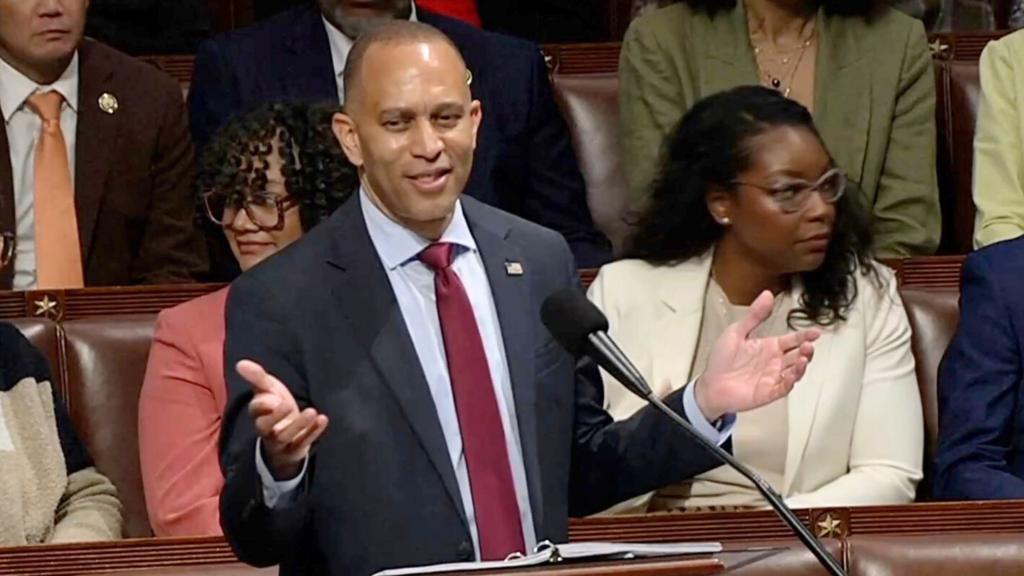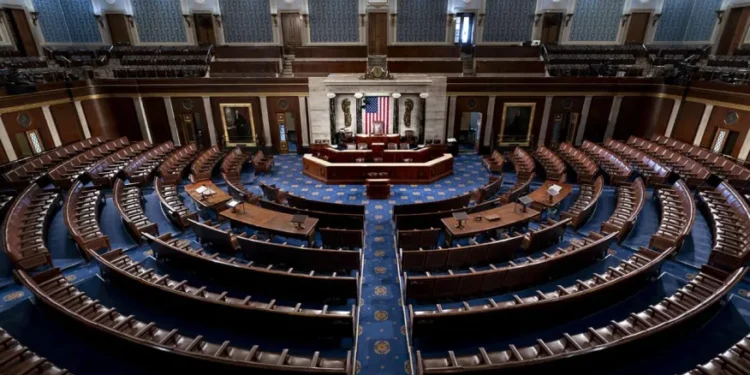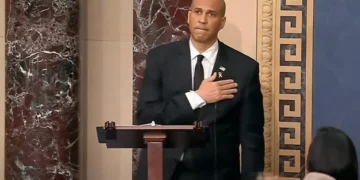July 3, 2025 Story by: Editor
House Minority Leader Hakeem Jeffries made history with the longest-ever House floor speech, aiming to stall a vote on the so-called ‘Big, Beautiful Bill.’ The House passed the bill despite the delay.
Jeffries surpassing the previous 8.5-hour record held by Minority Leader Kevin McCarthy’s (R-Calif.)
“I just want to express to the American people, we’re going to press on,” House Minority Leader Hakeem Jeffries said. “Press on for the sick… press on for the weak… press on for the rule of law… press on for democracy… until victory is won,” he says.
Using the “magic minute” rule, Jeffries spoke for over eight hours in an effort to delay a vote on President Trump’s $4.5 trillion budget and tax proposal, dubbed the “Big, Beautiful Bill.” His marathon speech highlighted concerns about cuts to social programs and the rushed legislative process, aiming to draw public attention and force a daylight vote.
House Minority Leader Jeffries (D-NY) used a little-known parliamentary rule and as of late Thursday morning, Jeffries was on track to surpass then-Minority Leader McCarthy’s (R-Calif.) record-breaking, 8-and-a-half hour speech to delay the Build Back Better vote in 2021. If Jeffries speaking until 1:23pm ET, set a new record.

Photo caption: House Minority Leader Hakeem Jeffries speaks on the House floor during a record-setting marathon speech aimed at delaying a vote on President Trump’s $4.5 trillion ‘Big, Beautiful Bill,’ July 3, 2025. (Photo courtesy of BBC)
New Jersey Sen. Cory Booker spoke for more than 25 hours on the Senate floor and broke the record for the longest continuous Senate speech in the chamber’s history.
Booker was assisted by fellow Democrats who gave him a break from speaking by asking him questions on the Senate floor, but Jeffries’ so called “magic minute” — a rule that gives leaders longer than the one minute all other members have to speak — does not allow for any interaction with other members.
Legislative Showdown
Jeffries invoked the House’s “magic minute” rule, allowing members to speak for unlimited time. Beginning at approximately 4:53 a.m., he embarked on a more than seven-hour filibuster—reading constituent stories, highlighting the proposed law’s cuts to Medicaid, Medicare, and social safety net programs. He decried the legislation as a “monstrous,” “reverse Robin Hood” bill that delivers tax breaks to the wealthy at the expense of vulnerable Americans.
The Senate version of the bill would lead to nearly 12 million people losing health insurance over the next 10 years because of Medicaid cuts, according to the nonpartisan Congressional Budget Office. It would institute work requirements for able-bodied adults under 65 years old — a key Republican priority — and it would alter the way states fund Medicaid.
The bill also includes huge funding increases for immigration enforcement and the military and would cut Biden-era clean energy tax credits, among other provisions.
What’s in the bill:
At some 887 pages, the legislation includes tax breaks, spending cuts, a rollback of solar energy tax credits, new money for national defense and deportations. The bill does not eliminate taxes on Social Security benefits, despite what Trump says. Read what’s in the full bill for yourself.
Congressional Budget Office review:
The nonpartisan CBO said Sunday the bill would pile nearly $3.3 trillion onto the nation’s debt load from 2025 to 2034, a nearly $1 trillion increase over the House-passed version of the bill. The analysis also found that 11.8 million Americans would become uninsured by 2034 if the bill passed.
Arguments and Impact
Jeffries detailed predicted consequences of the bill: the closure of medical facilities, increased utility costs, job losses, and damage to support programs for children, veterans, and seniors. He accused Republicans of seeking to rush the vote with only one hour of debate, arguing this undermines democratic process.
Strategic Objectives
According to internal Democratic sources, Jeffries intended to force Republicans to vote in daylight hours, making the process more transparent and visible to the public. His approach echoes past high-profile filibusters, including those by Sen. Cory Booker and former Speaker Kevin McCarthy—Jeffries even hinted at potentially setting a new speaking-length record.
Republican Response
Despite Jeffries’ marathon effort, Speaker Mike Johnson (R-LA) insisted the GOP maintained the votes to pass the legislation and was ready to proceed once he concluded. The bill had already cleared the Senate narrowly, with Vice President Vance casting a tie-breaking vote., and Republicans pursued a House passage before the July 4 deadline.
Fiscal and Social Stakes
The “Big, Beautiful Bill” merges tax extensions and new incentives with $1.2 trillion in spending cuts, including reductions to Medicaid, food assistance, and clean energy programs. The nonpartisan Congressional Budget Office (CBO) estimates the package will add roughly $3.3 trillion to the national debt and result in 11.8 million more uninsured Americans.
Why It Matters
Jeffries’s prolonged floor speech spotlights deep partisan divisions over the bill’s scope and priorities. It has highlighted concerns about process transparency, positioned Democrats as a visible check on GOP actions, and potentially shifts public focus as the US enters the July 4 holiday. With Republicans poised for a final vote, the timing and optics of the floor delay could impact momentum heading into the midterms.

















